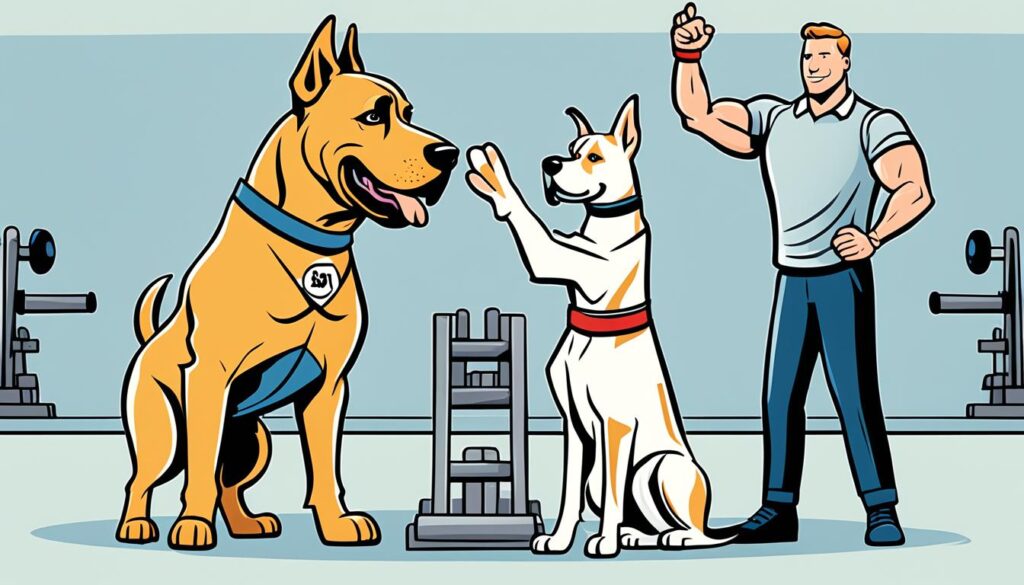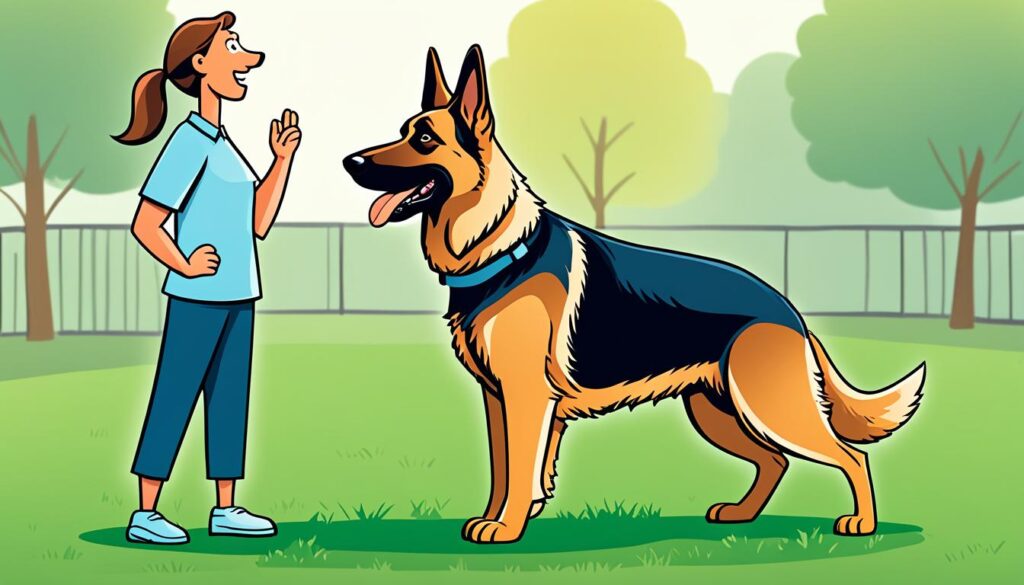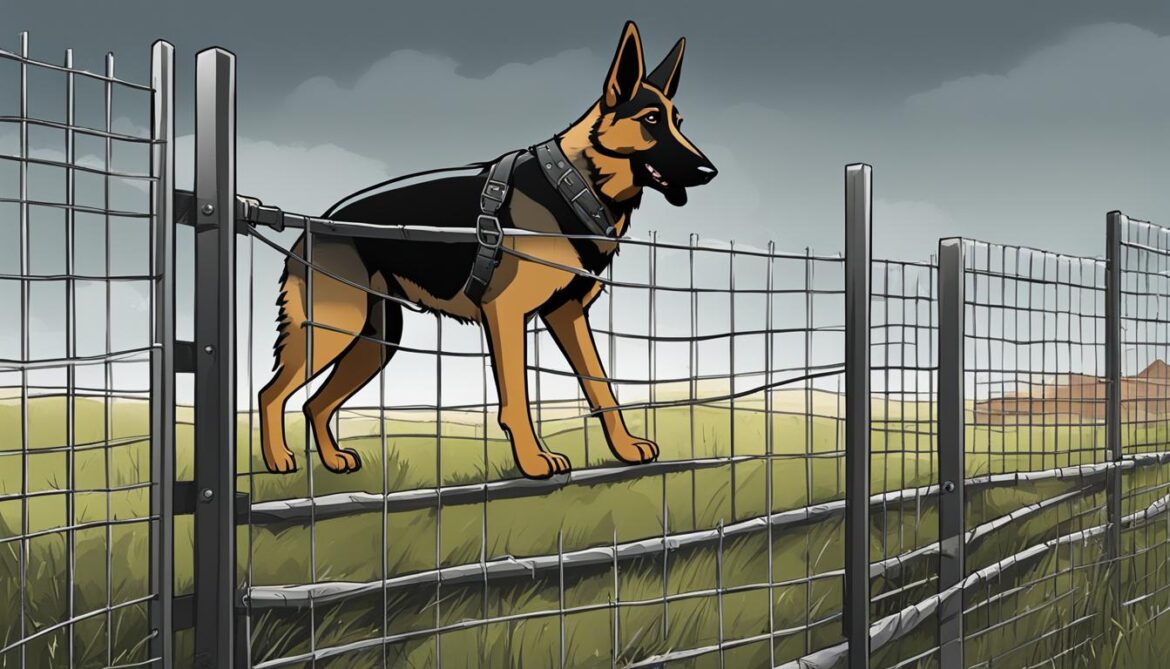Imagine a peaceful night at home, knowing that your furry companion is not only by your side but also standing guard to protect you and your loved ones. The sense of security and peace of mind that comes from having a well-trained guard dog is unlike any other.
Perhaps you’ve had moments when you felt vulnerable and wished you had someone to watch over you. Maybe you’ve experienced the anxiety of hearing a strange noise outside and wished your dog had the training to assess the situation and act accordingly. That’s where guard dog training comes into play.
Guard dog training is not just about teaching your dog to bark on command or growl at strangers. It is a comprehensive approach that taps into your dog’s natural protective instincts while molding them into a disciplined, obedient, and reliable companion.
However, the journey to developing an exceptional guard dog requires more than a few basic obedience classes. It calls for professional dog training that combines expertise, experience, and proven training techniques designed specifically for guard dogs.
Key Takeaways:
- Guard dog training taps into your dog’s protective instincts and develops their obedience and reliability.
- Professional dog training is crucial for unlocking your dog’s full potential as a guard dog.
- Guard dog training goes beyond basic obedience classes and requires specialized techniques.
- Having a well-trained guard dog provides peace of mind and a sense of security.
- Choose a qualified professional for guard dog training to ensure the best results.
Elevate Your Dog’s Skills with Advanced Guard Dog Training.
Take your dog’s training to the next level with advanced guard dog training techniques. These specialized methods will enhance your dog’s skills and strengthen their ability to protect you and your property.
In advanced guard dog training, the focus is on fine-tuning your dog’s instincts and teaching them advanced commands and behaviors. By incorporating these techniques, you can ensure that your dog is well-prepared to handle any potential threats.
“Advanced guard dog training is like giving your dog a set of superhero skills. It goes beyond basic obedience training and focuses on honing their natural protective instincts.”
One key aspect of advanced guard dog training is scent detection. Dogs have an incredible sense of smell, and harnessing this ability can be invaluable in security situations. By teaching your dog to associate specific scents with potential threats, you can train them to alert you to the presence of intruders or dangerous items.
Advanced Guard Dog Training Techniques:
- Targeting specific threats: Train your dog to differentiate between friendly and hostile individuals, responding appropriately to potential threats.
- Offensive and defensive maneuvers: Teach your dog techniques to deter intruders, such as barking, growling, and physical blocking, as well as methods to defend themselves if necessary.
- Advanced obedience commands: Introduce advanced commands that require your dog to think and react quickly, enhancing their overall responsiveness and control.
- Agility and obstacle training: Strengthen your dog’s physical abilities by incorporating agility exercises and obstacle courses into their training regimen.
To illustrate the effectiveness of these techniques, let’s take a look at the following example:
| Training Technique | Benefits |
|---|---|
| Scent Detection | Enhances the dog’s ability to detect potential threats and provides early warning. |
| Offensive and Defensive Maneuvers | Equips the dog with the skills to deter intruders and protect themselves and their handlers. |
| Advanced Obedience Commands | Improves the dog’s responsiveness and control, ensuring prompt and accurate execution of commands. |
| Agility and Obstacle Training | Strengthens the dog’s physical abilities and teaches them to navigate various environments. |
By incorporating these advanced guard dog training techniques into your dog’s training regimen, you can elevate their skills and enhance their overall performance as a reliable and effective guard dog.
Master Obedience Training for Effective Guard Dog Behavior.
In order to ensure your guard dog is reliable and responsive, obedience training plays a crucial role. By instilling discipline, control, and reliability in your dog’s behavior, you can have peace of mind knowing that they will act appropriately in any given situation.
During obedience training, your dog will learn to follow commands promptly, understand boundaries, and exhibit good behavior. This training not only enhances their effectiveness as a guard dog but also strengthens the bond between you and your furry companion.
Key Strategies for Obedience Training
Here are some proven strategies to help you master obedience training for your guard dog:
- Consistency: Consistently reinforce commands and behaviors to establish clarity and reinforce expectations.
- Positive reinforcement: Use rewards, such as treats or praise, to motivate and encourage desired behavior.
- Firm but gentle approach: Be firm in your training methods while maintaining a gentle approach to avoid intimidating or confusing your dog.
- Clear communication: Use clear and concise verbal cues, hand signals, and body language to communicate effectively with your dog.
- Patience and persistence: Training takes time, so be patient and consistent in your efforts. Stay persistent even when faced with setbacks or challenges.
The Importance of Basic Commands
During obedience training, it’s essential to focus on teaching your dog the following basic commands:
- Sit: Teach your dog to sit and stay in one place until you release them.
- Stay: Train your dog to remain in a designated spot until given permission to move.
- Come: Teach your dog to come to you when called, ensuring they respond promptly and reliably.
- Heel: Train your dog to walk calmly and obediently beside you without pulling on the leash.
- Leave it: Teach your dog to ignore distractions or forbidden items when commanded.
“Obedience training is the foundation of effective guard dog behavior. It establishes control, reliability, and a strong bond between you and your dog.” – Mark Johnson, Professional Dog Trainer
By incorporating obedience training into your guard dog’s routine, you are setting them up for success. Remember, consistency, patience, and positive reinforcement are key to achieving effective guard dog training.

Modifying Guard Dog Behavior for Optimal Performance.
When it comes to achieving optimal performance in your guard dog, behavior modification plays a crucial role. By shaping and modifying your dog’s behavior, you can ensure they respond appropriately in any situation. In this section, we will explore effective techniques for guard dog behavior modification and how they can enhance your dog’s performance as a protector.
Identifying Behavior Issues
Before you can address behavior issues in your guard dog, it’s essential to identify them. Common behavior issues in guard dogs include aggression, fearfulness, excessive barking, and lack of obedience. By understanding the specific behaviors your dog exhibits, you can tailor your training approach accordingly.
Positive Reinforcement Training
Positive reinforcement is a powerful technique for modifying guard dog behavior. By rewarding desired behaviors with treats, praise, or play, you can motivate your dog to repeat those behaviors. This approach encourages a positive association and strengthens the desired behavior, resulting in improved performance.
“Reward-based training methods have proven to be highly effective in modifying guard dog behavior. Consistency and patience are key when using positive reinforcement to shape your dog’s behavior.”
Counterconditioning
Counterconditioning is another valuable technique for behavior modification. It involves changing your dog’s emotional response to a specific trigger. For example, if your guard dog becomes reactive or anxious around strangers, you can gradually expose them to strangers in a controlled environment while providing positive experiences, such as rewards and praise. This helps your dog associate positive emotions with the trigger, leading to a more relaxed and controlled response.
Seeking Professional Guidance
In some cases, behavior issues in guard dogs may require the expertise of a professional dog trainer. A specialized guard dog trainer can assess your dog’s behavior, identify underlying causes, and develop a customized training plan to address them. Their experience and knowledge in specialized guard dog training techniques can significantly enhance the effectiveness of behavior modification.
Surrounding Your Dog with an Appropriate Environment
Creating the right environment is crucial for modifying guard dog behavior. Provide your dog with ample exercise, mental stimulation, and socialization opportunities. Additionally, ensure your dog has a designated space that meets their needs and is free from distractions or triggers that may contribute to unwanted behavior.
| Behavior Issue | Technique |
|---|---|
| Aggression | Positive reinforcement, desensitization, counterconditioning |
| Fearfulness | Gradual exposure, positive reinforcement, counterconditioning |
| Excessive barking | Redirecting focus, command training, positive reinforcement |
| Lack of obedience | Consistent training, reward-based methods, clear communication |
By implementing these techniques and seeking professional guidance when needed, you can modify and shape your guard dog’s behavior for optimal performance. Remember, behavior modification takes time, patience, and consistency. With the right approach, your guard dog will become a reliable and obedient protector.

Choosing the Best Guard Dog Trainer for Your Furry Companion.
When it comes to training your beloved guard dog, finding the right professional can make all the difference. With so many options available, it’s essential to select the best guard dog trainer who can provide the expertise and guidance your dog needs. Here are some tips and considerations to ensure you make the right choice:
- Research and Review: Start by researching and reviewing different guard dog trainers in your area. Look for trainers who specialize in professional dog training with a focus on guard dog training. Read reviews and testimonials from previous clients to get an idea of their effectiveness and reputation.
- Certifications and Credentials: A reputable and qualified guard dog trainer should have the necessary certifications and credentials. Look for trainers who have completed courses or programs from recognized organizations, such as the International Association of Canine Professionals (IACP) or the Certification Council for Professional Dog Trainers (CCPDT).
- Training Techniques: Every trainer may have their own approach to guard dog training. It’s essential to find a trainer whose techniques align with your training philosophy. Look for trainers who use positive reinforcement methods and focus on building a strong bond of trust and respect between you and your dog.
- Experience and Track Record: Experience matters when it comes to guard dog training. Look for trainers who have several years of experience and a proven track record of successfully training guard dogs. A seasoned trainer will have encountered various challenges and will be better equipped to handle any behavior issues that may arise.
- Customized Training: A good guard dog trainer understands that every dog is unique and requires a personalized approach. Look for trainers who offer customized training programs tailored to your dog’s specific needs and behavior. This ensures that your furry companion receives the individual attention and targeted training required for optimal results.
- Observation and Communication: Before committing to a trainer, take the time to observe their training sessions. Observe how they interact with the dogs and how the dogs respond to their commands. Additionally, have a conversation with the trainer to discuss your expectations, concerns, and goals. Clear communication is essential for a successful training partnership.
- Cost and Availability: While cost should not be the sole determining factor, it’s essential to consider your budget and the trainer’s fees. Compare prices and ensure that the trainer’s availability aligns with your schedule. Balancing affordability with quality is key to finding the best guard dog trainer.
“Finding the best guard dog trainer lays the foundation for a successful training journey.”
Remember, finding the best guard dog trainer lays the foundation for a successful training journey. Take the time to research, evaluate, and communicate with trainers to make an informed decision. With the right trainer by your side, you can unlock your dog’s full potential and ensure they become a reliable and effective guard dog.
| Tips for Choosing the Best Guard Dog Trainer | Considerations |
|---|---|
| Research and Review | Read reviews and testimonials to assess reputation |
| Certifications and Credentials | Look for trainers with recognized qualifications |
| Training Techniques | Select a trainer whose techniques align with your preferences |
| Experience and Track Record | Choose a trainer with a proven track record in guard dog training |
| Customized Training | Ensure the trainer offers tailored training programs |
| Observation and Communication | Observe training sessions and communicate effectively with the trainer |
| Cost and Availability | Budget-friendly fees and availability that suits your schedule |
Conclusion
In conclusion, investing in guard dog training is a wise decision that allows you to harness your dog’s innate protective instincts. By enlisting the help of a professional trainer, you can ensure that your dog receives the specialized training required to become a reliable and obedient guard dog.
Throughout this article, we have explored the importance of advanced guard dog training techniques. These methods elevate your dog’s skills, enabling them to provide enhanced protection for you and your property. Additionally, we have emphasized the significance of obedience training in developing effective guard dog behavior. Through proper discipline and control, your dog will respond appropriately in various situations.
To achieve optimal performance, behavior modification techniques can be employed to shape your guard dog’s behavior. By addressing specific behavior issues and reinforcing desired actions, you can optimize your dog’s capabilities as a protector.
Remember, choosing the right trainer is crucial in setting your guard dog on the path to success. By considering factors such as qualifications, experience, and training methodologies, you can find the best guard dog trainer for your furry companion, ensuring they receive the training they deserve.
